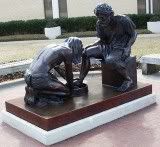ON THE ARMINIAN DOCTINE OF GOD AND THE MINNEAPOLIS BRIDGE COLLAPSE
Last Week Roger Olson, professor of theology at George W. Truett Theological Seminary at Baylor College offered an interpretation of that same event from the perspective of an Arminian doctrine of God. Here's an excerpt:The meaning of the collapse of this bridge is that John Piper is a sinner and should repent or forfeit his life forever. That means I should turn from the silly preoccupations of my life and focus my mind’s attention and my heart’s affection on God and embrace Jesus Christ as my only hope for the forgiveness of my sins and for the hope of eternal life. That is God’s message in the collapse of this bridge. That is his most merciful message: there is still time to turn from sin and unbelief and destruction for those of us who live. If we could see the eternal calamity from which he is offering escape we would hear this as the most precious message in the world.
We prayed during our family devotions. Talitha (11 years old) and Noel and I prayed earnestly for the families affected by the calamity and for the others in our city. Talitha prayed “Please don’t let anyone blame God for this but give thanks that they were saved.” When I sat on her bed and tucked her in and blessed her and sang over her a few minutes ago, I said, “You know, Talitha, that was a good prayer, because when people ‘blame’ God for something, they are angry with him, and they are saying that he has done something wrong. That’s what “blame” means: accuse somebody of wrongdoing. But you and I know that God did not do anything wrong. God always does what is wise. And you and I know that God could have held up that bridge with one hand.” Talitha said, “With his pinky.” “Yes,” I said, “with his pinky. Which means that God had a purpose for not holding up that bridge, knowing all that would happen, and he is infinitely wise in all that he wills.”
In this world, because of our ignorance and sinfulness, really bad things sometimes happen and people do really evil and wicked things. Not because God secretly plans and prods them, but because God has said to fallen, sinful people, "OK, not my will then, but thine be done -- for now."
And God says, "Pray because sometimes I can intervene to stop innocent suffering when people pray; that's one of my self-limitations. I don't want to do it all myself; I want your involvement and partnership in making this a better world."
It's a different picture of God than most conservative Christians grew up with, but it's the only one (so far as I can tell) that relieves God of responsibility for sin and evil and disaster and calamity.
The God of Calvinism scares me; I'm not sure how to distinguish him from the devil. If you've come under the influence of Calvinism, think about its ramifications for the character of God. God is great but also good. In light of all the evil and innocent suffering in the world, he must have limited himself.
I admit I wholeheartedly embrace and relish the Calvinistic doctrine of God. I find it difficult to imagine life apart from it. I also find the interpretation of evil offered by it personally satisfying. But when I delve deeply into this issue (which I am all for by the way), I encounter difficulties that seem to be insurmountable for fallen human understanding. Those are the places, in the hard work of loving God with all my mind, that I fall to my knees in awe and offer up sacrifices of praise to my infinitely beautiful God.
As the two excerpts above demonstrate, the contrast between the views is striking. There are basically two ways of interpreting the evil in this world with respect to the doctrine of God. Fundamentally, we must either admit a limitation in God (i.e. the autonomy of his moral creatures) or a limitation in ourselves (i.e. extreme difficulty in reconciling a paradox in God's revelation). Notwithstanding what I view as the clear testimony of Holy Scripture, I am much more comfortable with the latter. The English Puritan Stephen Charnock has put it rather wisely:
But what if the foreknowledge of God, and the liberty of the will, cannot be fully reconciled by man? Shall we therefore deny the perfection in God to support a liberty in ourselves? Shall we rather fasten ignorance upon God, and accuse him of blindness to maintain our liberty?
The Arminian says: Rather than blaming God for evil, let's blame him for ignorance instead.
The Calvinist says: Rather than blaming God for ignorance, let's blame ourselves for ignorance instead.
(HT: JT)
(originally posted at Solus Christus)




2 comments:
We are vessels of wrath, we are also imago dei. Piper bugs me sometimes because he doesn't always attach purpose to suffering. I know he knows it and writes about it other places, but if we are not told we are chastised for our good, we merely see God as an abusive, bipolar father. Piper is preaching to the choir and I agree with everything he says, but not always the way he says it.
Jay, thanks for posting this - it is a good contrast.
Post a Comment